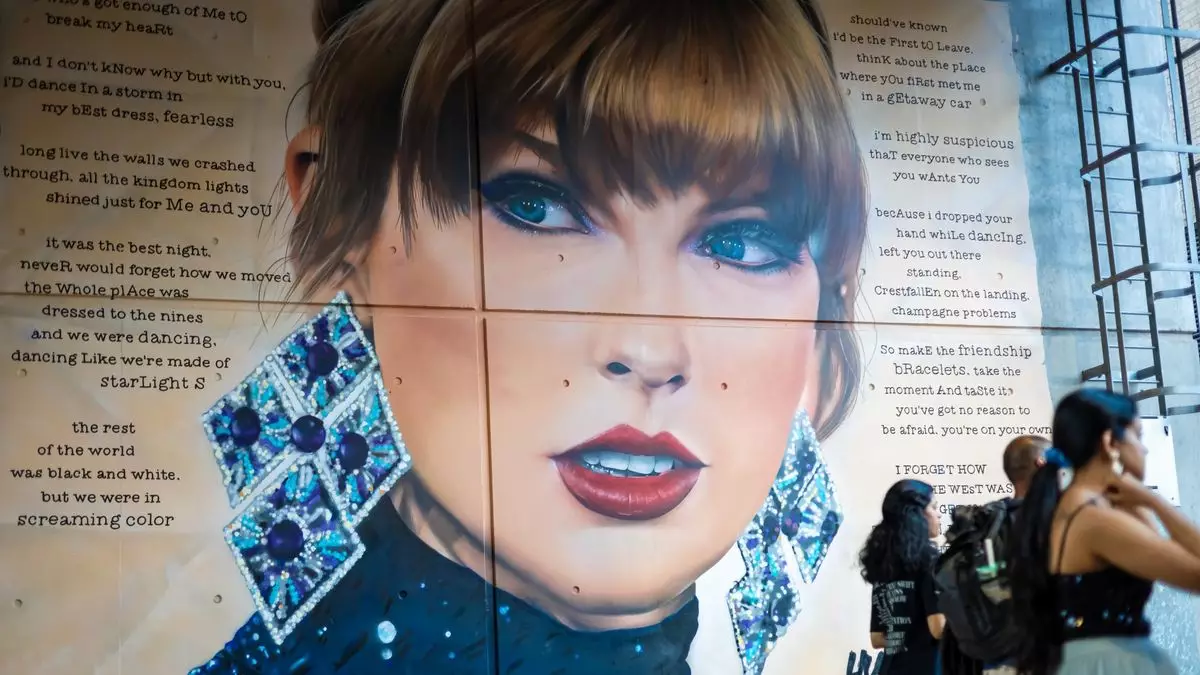The financial impact of music tours often goes unnoticed in the grand scheme of global tourism, yet few can rival the influence of Taylor Swift’s Eras Tour. With a staggering revenue boost to the hospitality industry, Swift has proven to be an unexpected force in economic engines traditionally dominated by major sporting events. A comprehensive evaluation of her tour reveals how it not only drives hotel revenues but also shapes travel patterns, creating economic ripples far beyond the arenas hosting her performances.
Taylor Swift’s Eras Tour has reportedly generated about $1 billion in additional hotel revenue across regions as diverse as the U.S., Europe, and Asia. This revenue surpasses that generated by significant events such as the Super Bowl and even the Olympics during peak times. According to Zach Demuth, global head of research at JLL’s hotels group, Swift’s concerts have effectively created “many, many mini-Super Bowls.” The economic footprint of her tour is profound, demonstrating the potential of a single artist’s events to influence local and global economies significantly.
For instance, during Swift’s residency in Las Vegas in March 2023, performance nights achieved astonishing occupancy rates of 90%, with per-night hotel rates averaging between $400 and $500. In contrast, the Super Bowl—a traditionally monumental event—reported around 80% occupancy with an average nightly rate of approximately $600. This showcases not only Swift’s ability to sell out venues but also her unique capacity to attract large numbers of fans who are willing to spend significantly on accommodations, food, and experiences in the host city.
Hotels and hospitality providers have capitalized on this economic boon by crafting Swift-centric experiences that resonate with her dedicated fanbase. For instance, the JW Marriott Miami Turnberry experienced an influx of nearly $1 million in room revenue during Swift’s Miami shows. Hotel management took the initiative to adopt a strategy akin to what one might expect during major sporting championships. They designed special programming aimed at enhancing the overall experience for concert-goers, including bracelet-making stations and Swift-themed cabanas at their water park.
These efforts reflect a larger trend in which hospitality venues are not merely passive beneficiaries of tourist influx but are, instead, actively engaging their customers to maximize revenue opportunities. The inclination to implement Swift-focused events is not merely a business maneuver; it is a strategic adaptation responding to the cultural phenomenon that her concerts represent.
The Eras Tour has also influenced international travel dynamics, drawing fans from across the globe. Interestingly, JLL data indicates that over half of Swift’s European concertgoers were non-European, with a significant portion being American fans. This trend illustrates a surprising economic reversal: For many U.S. fans, tickets to her European concerts—along with the associated travel expenses—were often more affordable than attending a show domestically due to favorable exchange rates and ticket pricing structures.
This newfound international appeal has seemingly breathed new life into travel agencies and related service sectors. For example, advisors like Tim Davis have noticed a marked increase in the demand for complex, multicity travel arrangements involving Swift’s tour stops. Davis’s business reported exceptional sales figures, demonstrating that fans are willing to invest in a far-flung concert experience that offers them a once-in-a-lifetime opportunity.
Beyond the immediate income generated by ticket sales and hotel bookings, Swift’s economic influence permeates multiple sectors, contributing to the overall health of the global economy. Hyatt’s CEO noted that the “Taylor Swift effect” significantly boosted their performance, rivaling even traditional tourism drivers like the Olympics. This broader economic impact could reasonably be tied to a few hundred basis points added to global GDP, underlining the artist’s role as a vital player in modern economic landscapes.
With the ongoing success of the Eras Tour and the enthusiasm it has generated, the hospitality and travel industries can likely expect a sustained impact long after the final curtain falls. Music has a way of uniting fans and inspiring travel, and Swift’s unique ability to spark this activity shatters the boundaries between entertainment and economic performance.
Taylor Swift’s Eras Tour symbolizes a new age in hospitality and travel, proving that the influence of a single artist can spur extraordinary economic growth, reshape travel habits, and influence the hospitality industry in ways previously unimagined. As we continue to navigate the evolving landscape of entertainment and tourism, it’s clear that Swift’s tour is more than just a music event; it’s a transformative force in the global economy.


Leave a Reply